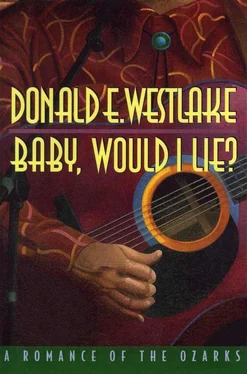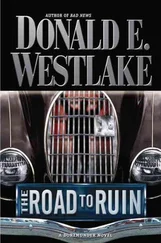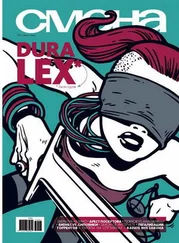Here’s what Ray Jones had responded to all that : that the dimwitted old broad next door couldn’t find her ass with both hands. Her banker son in St. Louis owned the house and came down to play golf on weekends, and he’d parked his senile old mother there because it was cheaper than both an alarm system and a nursing home. She had the wrong night, that’s all, if she actually had gone spying at almost three in the morning and seen lights over at his place. As to the sound of guitar playing, when he did make music at night, it was to try out new material or new arrangements and he always videotaped himself in his living room and dated the tapes, and the tapes were right there in that closet under the stairs and the cops had seen them all and there were none for the night of July 11 to 12. As for the fireplace, he’d used it a total of two times, both of them the first week he’d owned the house, only to discover it had been built without regard for the niceties of fireplace construction, such as where you put the throat and the smoke shelf, and the correct balance of height and width and depth of opening, so that the damn thing smoked enough to cure a turkey. If somebody had taken his car and misbehaved in it, he was sorry, but glad anyway they’d at least brought the car back. As to talking with Belle Hardwick at the Ray Jones Country Theater, she was an employee of his; he talked to his employees all the time. So what?
So the indictment. Starting day after tomorrow, jury selection.
In the meantime, life, if that’s the word he was looking for, went on. The feds, principally in the person of Leon “T P” Caccatorro, had groused and fidgeted about the $2 million bail but grudgingly admitted it was better for all concerned, including the government of, by, and for the people, that Ray Jones remain outside earning rather than inside tarnishing his reputation with the wrong kind of jail time. (Drunkenness, brawling, wife beating, drug taking but not drug dealing, hitting a cop after a speeding stop — all could produce the right kind of reputation-enhancing jail time.)
Not since Jerry Lee Lewis had the people been serenaded by a potential killer; the Ray Jones Country Theater was absolutely sold out, 827 seats, two shows a day, 3:00 and 8:00 P.M. In the meantime, between shows, waiting for the trial, he went on doing what he’d always done. May to November, the last four years, ever since joining the country gold rush to Branson. He hung out with his pals; he played golf on this nice easy course outside his door; late at night, he tried to write songs or rework old material in front of the fixed video camera over there mounted next to the VCR above the TV beside the stereo equipment, in the mahogany built-in with the Mexican doors.
Fewer pals now; mostly just the people who still had business dealings with him. The four guys seated at the round table in his living room at this moment, continuing the stud hand without him, were his manager. Chuck Wagner; his froglike L. A. agent, Milt Lieberson; his scrawny-bearded musical director, Lennie Elmore; and his best friend, Cal Denny, the only one who was there even though he didn’t have to be. The nation’s press — hell, the world’s press — was beginning to camp out at the entrance to Porte Regal, the closest they could get to this house, and a lot of Ray’s fair-weather friends had decided this just wasn’t the right moment to stand up and be counted in his corner. Well, we’ll remember, boys, we’ll remember.
Out this window, beyond the terrace and the wood railing, the lawn sloped gently down to a little skinny artificial stream along his property line, a trickle of water thin enough to step over. Beyond it, the land sloped gradually upward, immediately crossed by a narrow blacktop ribbon of road, just wide enough for the little two-person, two-bag golf carts. And beyond the blacktop was the tee for the thirteenth hole, so there were usually three or four carts parked down there. Five carts now, ten people up by the tee. Interesting how not a one of them looked in this direction; Ray Jones was an embarrassment, just at the moment, in this land of peaceful retirement and Christian privilege.
Or maybe it was the K-9 deputy they weren’t looking at. Once again, a deputy and a sniffer dog prowled this way and that across Ray’s lawn, searching hard, and he knew for what. The messed-up clothes, that’s what. Even the prosecuting attorney over there in Forsyth was having trouble with that 3:00 A.M. fire story. The ashes from Ray’s useless fireplace had been examined, bagged, taken away, and studied by scientists, and they knew the”burned the clothing in the fireplace” story was a crock. They were still hoping, with their sniffer dogs, to find someplace he might have buried the stuff.
Well, good luck, Ray silently told the deputy and his dog, but you got all you’re ever gonna get on me. The question is, is it enough?
“Hey, Ray,” Chuck called from over at the table. “You in or out?”
“Always in. You know me,” Ray said, turning his back on the golf course and the deputy and the beautiful weather here in Afterlife Village. “Just give me a hand I can play, will ya?”
“There isn’t any there there,” opined Harry Razza, standing at the intersection of routes 76 and 165, where, beneath a nonfunctioning traffic light, a brown-uniformed deputy sheriff pinwheeled and pirouetted, directing endless lines of slow and patient pachydermic traffic on and off and along the Branson Strip, where all the theaters and restaurants and family attractions baked in the summer sun.
“That was Winston Churchill, I believe,” Louis B. Urbiton suggested, trying to locate the source of Harry’s quote.
But Harry would have none of it. “Not a bit, old man,” he said. “Lord Mountbatten it was, in re Africa.”
Bob Sangster, the third member of the group, who had been watching the hyperactive deputy out there under the traffic light as though waiting to see him explode, said, “Dorothy Parker. Los Angeles.”
“Nonsense,” Louis B. Urbiton decided, and that was that.
The three men had apparently somehow annoyed their driver, the chap who’d been paid quite handsomely to deliver them from the airport up at Springfield to the Palace Inn in Branson. However it was they’d managed to put his nose out of joint, his revenge had been terrible. Instead of at any hotel at all, he had deposited them here at this intersection, had dumped their luggage from the trunk of his vehicle to the sidewalk, and had departed. And now, without transportation, without a native guide, left alone and friendless at this godforsaken intersection in the middle of the untamed wilds of America, what was to become of the Down Under Trio?
The Down Under Trio, as they were known to their coworkers, were all originally from Australia and had kept their slithery accents to prove it. All had once upon a time been journalists but now were employed by a scurrilous rag called the Weekly Galaxy, headquartered in a section of central Florida that looked — and was — even more godforsaken than this spot here, were that possible. The trio consisted first of Harry Razza, an aging matinee idol with thickly sculptured — and no doubt dyed — auburn hair, a remarkably untrustworthy narrow mustache, and the roguish smile of one who sees himself, despite all the evidence to the contrary, to be quite the ladies’ man. Second, there was Bob Sangster, a rangy, laconic, workmanlike fellow with a large nose and the unruffled manner of a paid-up union member. And finally, there was Louis B. Urbiton, oldest and usually drunkest of the trio, an indefatigable reveler and cutup with a deceptively mature and even bankerish mien.
Though not at the moment, in emergency conditions here at this intersection. “Something must be done,” announced Louis B. as he sensed the bourbon growing warm in the flask in his hip pocket, subjected to all these harmful rays of the sun.
Читать дальше







